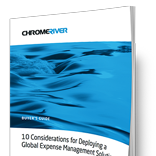German per diems may not suddenly spring to mind as a critical business issue for global organisations. However, if you work in the world of corporate travel, expense or accounting, it can be a major source of angst.
Many of us are aware of how the per diem system works. The traveller submits a request (based on the city/country and dates of travel) and receives funds to cover lodging, food and incidentals on the trip. Funds are usually provided in advance, either directly to the traveller's account or onto a pre-paid card. Using this process removes the need for receipts to be submitted for reimbursement, levels the playing field for employees, and, as long as everything has been done correctly, there is usually no need for these to be reported for the employee’s taxes.
In Germany, however, the system is far more complex. Per diem calculations are based on a wide variety of factors, ranging from the start and end times of the trip (as well as the day), if an overnight stay was in paid lodging or not, whether a border is crossed on any given day during the trip, and even how, where, and when that crossing took place. Let’s also not forget that if you anticipate any meals being provided during that time, they have to be deducted. And then of course if an employee works in a specific location for more than three months without a break, the per diem also becomes taxable, unless a set of other criteria are hit.
All these permutations can make calculating per diem payments and taxation a significant challenge for any organisation with employees based in Germany. The potential for a per diem advance payment to contain an error is significant, which leaves both organisations and employees at risk of regulatory noncompliance (and potential legal liability) through incorrect tax calculations.
This high level of complexity has also traditionally made the process difficult for expense solutions to effectively manage, especially on the back end for tax calculations. As a result, employees and organisations have often needed to use two systems for per diems and other expenses, with per diems often needing to be managed with spreadsheets. This not only made the submission and approval process more cumbersome, but also made it significantly harder for organisations to effectively manage and analyse this spend data. Per diem forms and approvals then needed to be manually entered into the accounting system, increasing the risk of data entry errors, and leaving organisations exposed to the potential for noncompliance with regulations.
Learn More: 10 Considerations for a New Global Expense Management Solution
This is why we’re excited to have launched our enhanced functionality for managing German per diems directly within the Chrome River EXPENSE application, making it an even more powerful solution for our German customers. Users now simply need to launch the per diem wizard in their expense category window, where they will be led through a simple step-by-step process to accurately calculate each day’s advance. This data will also automatically reconcile with the organisation’s accounting program, to ensure it’s correctly reflected in the employee’s and employer’s taxes. It also enables more accuracy and efficiency in reporting employee spend, and provides a clear audit trail for ensuring regulatory compliance.
If your organisation has Germany-based employees, an accurate and efficient solution for managing the per diem process is critical. Choosing the wrong solution could not only frustrate your team, but also leave your organisation at risk of falling foul of the BZSt.
Search
Subscribe
Latest Posts
- UK Finance Leaders Reveal Biggest Concerns for the Post-COVID Recovery
- 9 Signs it’s Time to Switch Expense Management Systems
- How We Did It: Supporting Front Line Healthcare Workers During the COVID-19 Outbreak
- Managing Traveller Safety in a Post-Coronavirus World
- Controlling Car Rental Spend With Car FOLIO
Posts by Category
Our choice of Chrome River EXPENSE was made in part due to the very user-friendly interface, easy configurability, and the clear commitment to impactful customer service – all aspects in which Chrome River was the clear winner. While Chrome River is not as large as some of the other vendors we considered, we found that to be a benefit and our due diligence showed that it could support us as well as any large players in the space, along with a personalized level of customer care.
We are excited to be able to enforce much more stringent compliance to our expense guidelines and significantly enhance our expense reporting and analytics. By automating these processes, we will be able to free up AP time formerly spent on manual administrative tasks, and enhance the role by being much more strategic.
